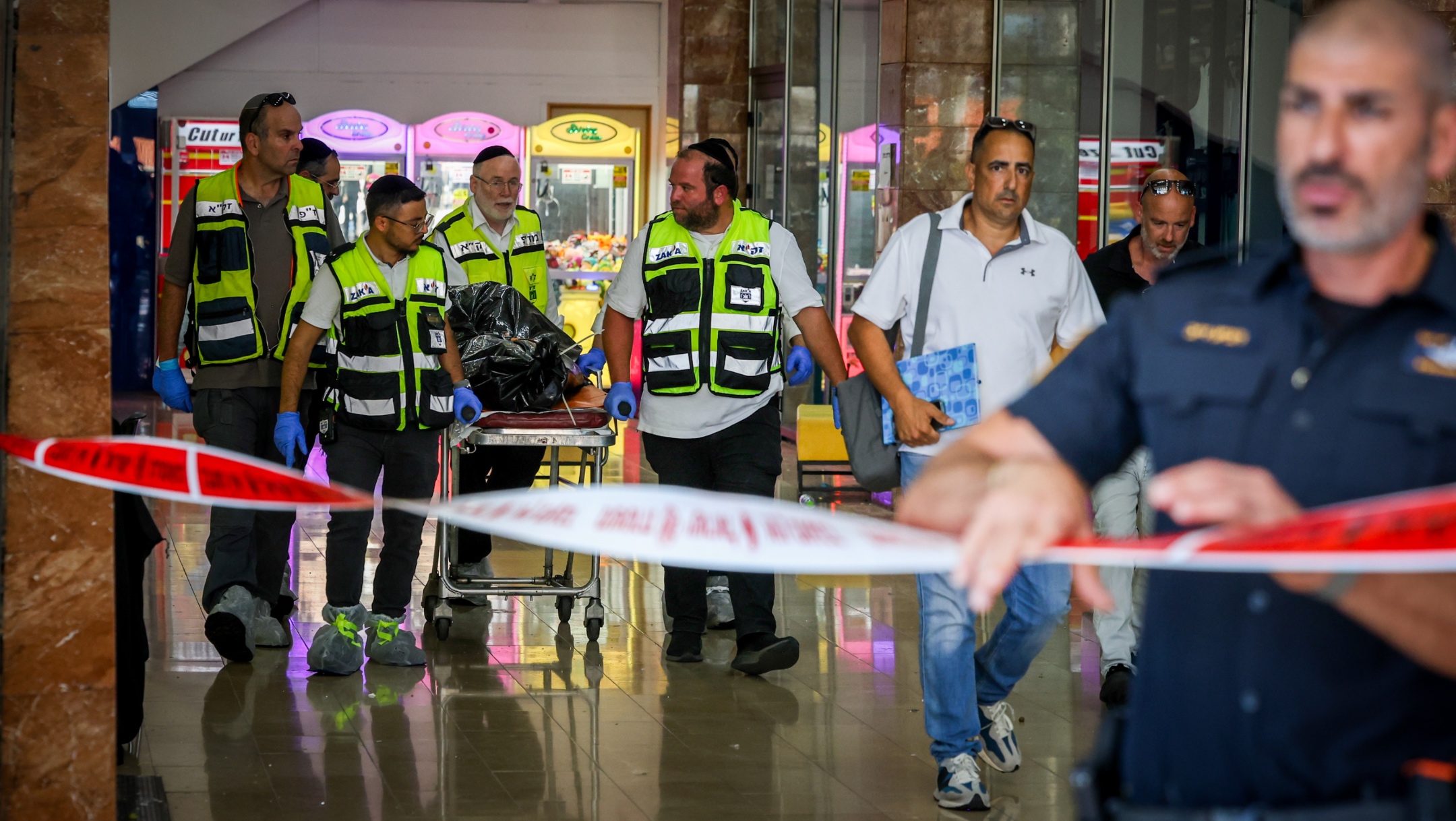Israel and Hamas mulling latest hostage deal as unrest roils region
An Israeli Arab citizen stabbed a soldier to death in northern Israel

Police and rescue forces outside the scene of a stabbing attack in Karmiel, northern Israel, July 3, 2024. (David Cohen/Flash90)
(JTA) — Israel and Hamas were considering the latest hostage deal, officials on both sides said, while an Israeli Arab citizen stabbed a soldier to death in northern Israel and unrest continued to roil the region.
Israel’s Mossad security agency and Hamas both issued terse statements on Wednesday saying they had in hand the latest version of a deal that would end hostilities for at least six weeks while Israel and Hamas swapped hostages for Palestinian prisoners.
“The hostages deal mediators have conveyed to the negotiating team Hamas’s remarks on the outline of the hostages deal,” the Mossad spy agency said in its statement, referring to Egypt and Qatar, which had solicited input from Hamas on the latest compromise. “Israel is evaluating the remarks and will convey its reply to the mediators.”
Hamas in its statement was also noncommittal. “We exchanged some ideas with the mediator brothers with the aim of stopping the aggression against our Palestinian people,” it said.
Axios quoted two Israeli officials as saying the Hamas input was “much better” than its previous responses.
What that means is not yet clear. The deal, proffered in May by the Biden administration with Israel’s approval, would stop fighting for six weeks while Israel gets hostages still held by Hamas — believed to number 120, living and dead — in exchange for the release of Palestinian prisoners.
Until now disagreement over which side stays and which side goes has frustrated any further action on the deal. Israel wants Hamas dismantled, politically and militarily, to end the war. Hamas wants Israeli troops to leave the enclave entirely.
Israel’s military is concerned that the failure to stop fighting in Gaza could lead to a full-on multi-front war. The day after Hamas launched the war on oct. 7 with massacres inside Israel, Hezbollah opened up another front on the border with Lebanon, and its leaders have said they would not stand down until Hamas is ready too. Both Hamas and Hezbollah are backed by Iran.
The sides have managed to keep the ensuing exchanges on Israel’s northern border at a simmer, but in recent weeks it has threatened to escalate. Lebanon-based reports said Israel on Wednesday killed a senior Hezbollah commander in a strike. Previous such killings have been followed by intensified shooting exchanges.
Fighting continued to rage in the Gaza Strip. The army reported that a soldier was killed and three were seriously injured Wednesday in battle in the northern Gaza Strip, an area that the military had previously treated as quiescent.
An Israeli Arab assailant was meanwhile killed after he stabbed three people in a mall in Carmiel, a town in northern Israel, killing a soldier. The war has until now has not reverberated in interethnic violence in Israel, unlike a 2021 conflagration between Israel and Hamas which led to street battles in some mixed Arab Jewish cities.
An added destabilizing factor is unrest in the West Bank, spurred in part by settlers emboldened by Prime Minister Benjamin Netanyahu’s government, which includes extremist pro-settlement ministers. The Associated Press and Peace Now, a settlement tracking group, on Wednesday reported that the government appropriated five square miles of land in the Jordan valley, the largest such expropriation in decades.
The army reported that masked West Bank settlers on Wednesday attacked a civil administration vehicle carrying a senior Israeli officer after the army evacuated a settlement deemed illegal according to Israel law. The masked settlers hurled stones at the car, smashing its windows, as well as a firebomb.
Lt. Gen. Herzi Halevi, the military chief of staff, decried the attack as a “a severe, violent incident, that must be denounced and condemned. The law must be quickly and swiftly exacted upon the rioters who attacked the security forces as they attempted to carry out their mission.”













